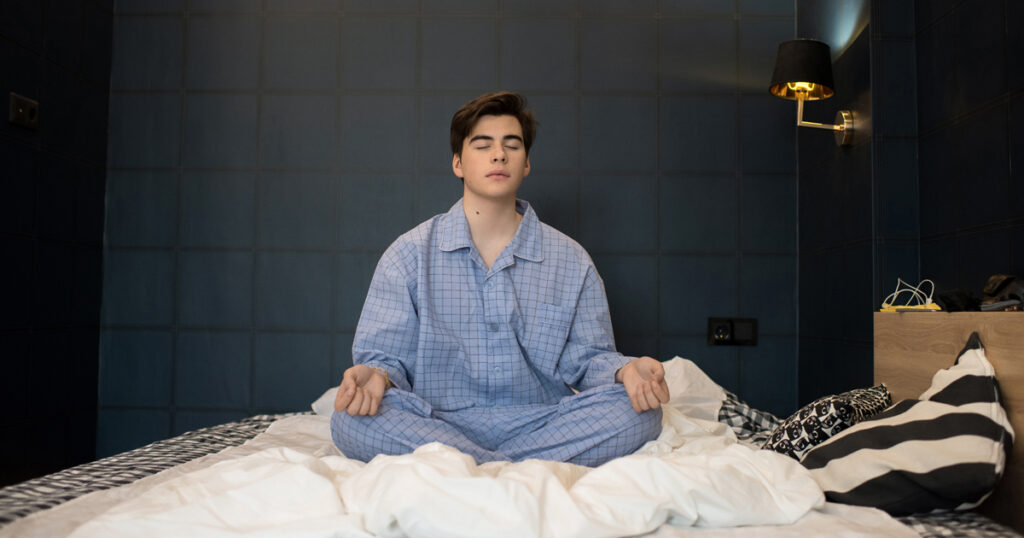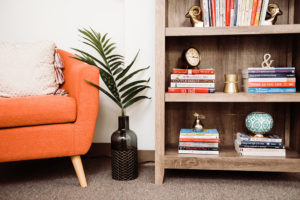Have You Been Tossing and Turning All Night? Improve Your Sleep Hygiene
Do you ever find yourself in bed scrolling through the infinite land of Twitter or Instagram and before you know it an hour has passed by? After that first hour passes, you probably find yourself worrying about what time you will fall asleep… which is then perpetuated by the anxiety about being awake that you can’t fall asleep. If this unhelpful cycle of events has consumed a big chunk of your sleeping hour, then sleep hygiene might be helpful for you to consider.
What is Sleep Hygiene & Why is It Important?
According to the Center for Disease Control, things like insomnia, sleep apnea, and restless leg disorder can impact a person’s quality of sleep, which then effects one’s concentration, energy levels and even mental health. They suggest that sleep hygiene, which they define as “a series of steps to set up proper sleep habits”, can help improve a person’s overall sleep health.
But why is your sleep health important? Research shows that not getting enough sleep can lead to negative physical side effects such as:
- high blood pressure
- weakened immune system
- risk for high blood pressure or heart disease
- low sex drive
These effects do not include the emotional and cognitive toll that can also occur as a result of poor or not enough sleep.
What Steps Can You Take to Improve Your Sleep Hygiene?
Improving sleep hygiene doesn’t need to be complicated. With a few simple changes to your habits, you can create a more sleep-friendly environment and set yourself up for better rest. Here are some practical strategies you can use to improve your sleep hygiene:
- Stick to a Consistent Sleep Schedule: Go to bed and wake up at the same time every day, even on weekends. Consistency helps regulate your body’s internal clock, making it easier to fall asleep and wake up naturally.
- Avoid Naps: While napping may seem tempting after a restless night, it can affect your ability to fall asleep when bedtime rolls around. Limiting naps, especially late in the day, can help improve your nighttime sleep.
- Develop an Evening Routine: Establish a calming pre-bedtime ritual, like reading a book, taking a warm bath, or practicing gentle stretches. Routines like these signal to your body that it’s time to relax and prepare for sleep. Proper sleep hygiene means training both body and mind to wind down.
- Limit Screen Time Before Bed: Try not to watch TV or scroll through your phone right before bed. The blue light emitted by screens suppresses melatonin production—the hormone responsible for regulating sleep. Instead, consider using blue-light-blocking glasses or setting devices to “night mode” if you absolutely must use them.
- Create a Sleep-Conducive Environment: A comfortable sleep environment is crucial to good sleep hygiene. Keep your bedroom cool, dark, and quiet. Invest in a comfortable mattress, pillows, and blackout curtains if needed. Make sure your sleep space is designed solely for rest.
- Reserve the Bed for Sleep and Intimacy: Avoid working, eating, or watching movies in bed. Your mind should associate the bed with sleep rather than stimulation. When your brain associates the bed only with sleep, falling asleep will feel more natural.
- Hide the Clock: If you find yourself constantly checking the time at night, try putting the clock away or turning it face down. Watching the clock can create anxiety and make it even more difficult to fall asleep.
- Be Mindful of Your Diet: Avoid large meals, caffeine, and alcohol before bedtime. Caffeine can stay in your system for hours and impact your ability to fall asleep. Similarly, alcohol might make you feel sleepy at first, but it can disrupt your sleep cycle later in the night.
- Exercise Regularly: Exercise is a great way to improve sleep hygiene and overall health. Regular physical activity—done earlier in the day—can help you fall asleep faster and enjoy deeper sleep. Avoid vigorous exercise too close to bedtime, as it may have the opposite effect and keep you alert.

Relaxation Techniques to Help with Sleep
Improving sleep hygiene also involves finding ways to calm your mind. Often, we stay awake not because our bodies aren’t ready to sleep, but because our minds are racing. Here are some relaxation strategies that can help you unwind:
- Breathing Techniques: Deep breathing exercises can help calm your nervous system and ease anxiety, making it easier to fall asleep. Try the 4-7-8 breathing technique: inhale for 4 seconds, hold for 7 seconds, and exhale slowly for 8 seconds.
- Mindfulness and Meditation: Mindfulness meditation can significantly improve sleep quality by reducing stress. There are numerous meditation apps available to guide you through the process, making it accessible to anyone looking to improve their sleep hygiene.
- Progressive Muscle Relaxation: Tightening and then slowly relaxing different muscle groups helps to release tension in the body, signaling that it’s time for rest.
Struggling with Anxiety or Depression? We’re Here to Help.
If you’ve improved your sleep hygiene but still find it difficult to fall asleep due to anxiety or an overactive mind, it may be helpful to speak with a mental health professional. Anxiety and depression can have a significant impact on sleep quality, but there are effective treatments that can help.
At Lincoln Park Therapy Group, we understand the importance of good sleep hygiene and the impact sleep has on mental well-being. If you’re struggling with sleep, anxiety, or any other mental health challenge, our therapists are here to help. We’d love to meet you and support you on your journey to better sleep and a healthier life. Contact us today to schedule an appointment.

 Nicolle Osequeda, LMFT, is the founder of Lincoln Park Therapy Group, specializing in anxiety, depression, and relationship counseling in Chicago. As a Certified Daring Way™ Facilitator, she incorporates Dr. Brené Brown’s research into her therapy. Nicolle holds a Master’s in Counseling Psychology from the University of San Francisco and is a Licensed Marriage & Family Therapist in Illinois and California. She is a Clinical Fellow of AAMFT, a member of IAMFT, and the Financial Therapy Association. Nicolle has Gottman Method training and has taught at DePaul University, dedicated to helping individuals and couples achieve meaningful change.
Nicolle Osequeda, LMFT, is the founder of Lincoln Park Therapy Group, specializing in anxiety, depression, and relationship counseling in Chicago. As a Certified Daring Way™ Facilitator, she incorporates Dr. Brené Brown’s research into her therapy. Nicolle holds a Master’s in Counseling Psychology from the University of San Francisco and is a Licensed Marriage & Family Therapist in Illinois and California. She is a Clinical Fellow of AAMFT, a member of IAMFT, and the Financial Therapy Association. Nicolle has Gottman Method training and has taught at DePaul University, dedicated to helping individuals and couples achieve meaningful change. 

